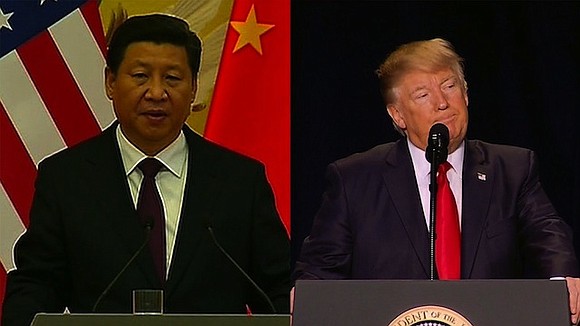Trump Says He Would Consult With China's Xi Before Speaking To Taiwan
CNN/Stylemagazine.com Newswire | 4/28/2017, 3 p.m.

(CNN) -- US President Donald Trump has said that he would want to consult with Chinese President Xi Jinping before speaking to Taiwan's leader.
In an interview with Reuters news agency, Trump said he wouldn't want to "cause difficulty" for the Chinese leader by again breaking with the "one China" policy.
"He's a friend of mine. He's actually a -- I think he's doing an amazing job as a leader, and I wouldn't want to do anything that comes in the way of that. So, I would certainly want to speak to him first," Trump said.
Beijing considers Taiwan a "renegade province" and under the "one China" policy the US has a long tradition of respecting that stance.
Trump caused ructions late last year when as President-elect he accepted a congratulatory phone call from Taiwanese President Tsai Ing-wen. As China launched an official complaint, Trump tweeted: "Interesting how the U.S. sells Taiwan billions of dollars of military equipment but I should not accept a congratulatory call."
Tsai recently told Reuters that another call between herself and Trump was a possibility. "We have the opportunity to communicate more directly with the US government," Tsai said in the interview, although she conceded that China's influence would be a consideration of Trump's.
"We don't exclude the opportunity to call President Trump himself, but it depends on the needs of the situation and the US government's consideration of regional affairs."
Since coming to office, Trump's rhetoric on China has improved dramatically as he seeks the country's help in putting pressure on North Korea to stop its missile and nuclear tests.
"Well, my problem is that I've established a very good personal relationship with President Xi. And I really feel that he is doing everything in his power to help us with a big situation, so I wouldn't want to be causing difficulty right now for him," he said, referring to the increasingly tense standoff with Pyongyang.
Early diplomatic snafu
Shortly after his election, as President-elect, Trump had a 10-minute phone conversation with Tsai, a move that angered Beijing and upended decades-long US policy on China and Taiwan.
Washington officially acknowledges Taiwan being part of China and the People's Republic's status as the sole legitimate government of China, a stance that forms the basis of Chinese diplomacy and policy-making and determines Sino-US relations.
Beijing lodged an official complaint after the call. And in Communist Party newspapers, the reaction was harsh.
"No matter what the reasons are behind Trump's outrageous remarks, it appears inevitable that Sino-US ties will witness more troubles in his early time in the White House than any other predecessor," said an op-ed in the Global Times.
Before the call, no US President or President-elect had spoken directly to the Taiwanese leader since the 1970s, and the then-Secretary of State said the Trump transition team had not contacted the Department of State ahead of the call.
Despite being bullish on the future of the US' official position on the matter, Trump eventually reneged and committed to the decades-long policy.
Warming relations
Sino-US relations seemed to have righted somewhat after Xi and Trump met earlier in April at the US President's Mar-a-Lago resort in Florida.
Now Trump, eager to stop rapid advances in North Korea's nuclear and ballistic missile programs, is signaling a break with decades of US policy as he looks to commit China to ramping up pressure on North Korea.
Trump's sweetening the pot, offering China better trade terms if the Asian powerhouse takes steps to put North Korea's provocative behavior to rest. China accounts for 80% of North Korea's foreign trade and has significant political leverage over North Korea.
For more information go to http://www.cnn.com



